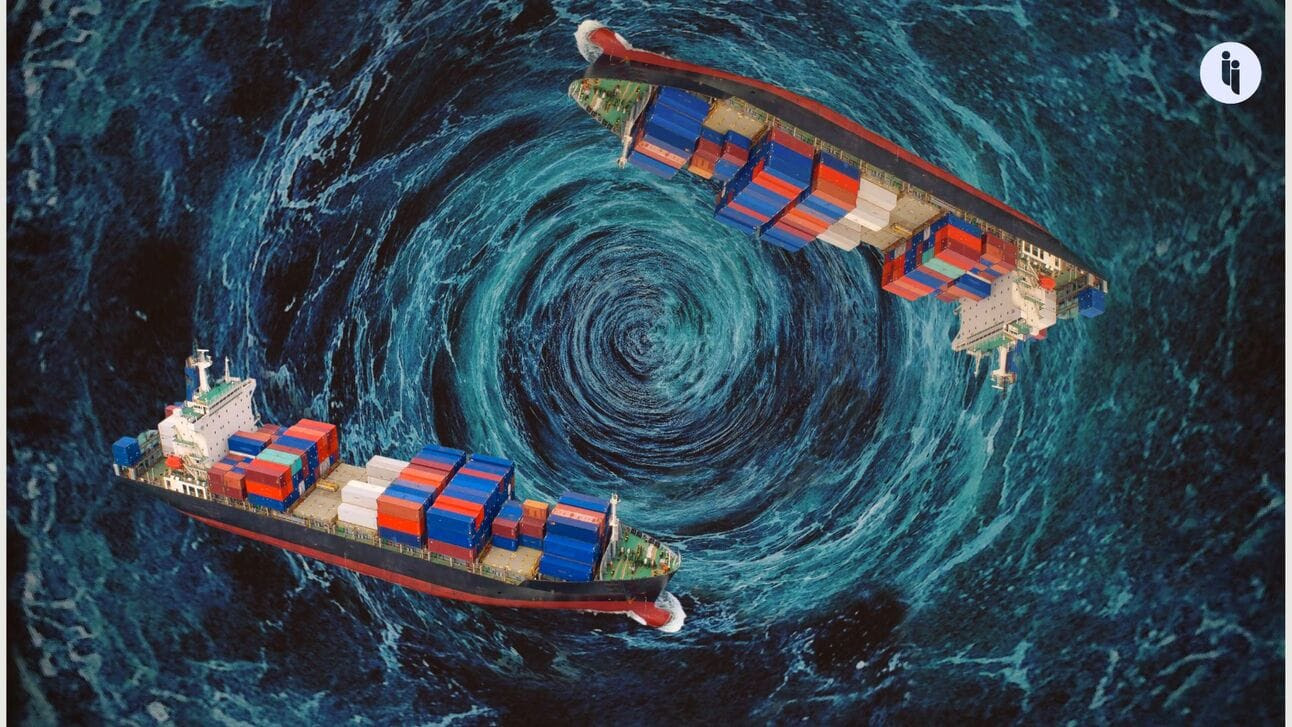AP Møller-Maersk, the world’s second-largest shipping company, just told its clients that ongoing disruptions in the Red Sea will gobble up 15-20% of the entire shipping industry’s capacity along the Asia-Europe route.
“Disruptions” is a very Danish-shipping-giant way to describe what’s going on: Yemen’s Houthis have been attacking commercial ships in the Red Sea since November. And they’ve pledged to keep it up until Israel withdraws from Gaza.
That’s prompted the West to lead three operations (Prosperity Guardian, Poseidon Archer, and Aspides) to swat Houthi drones and missiles out of the sky and destroy its launch capabilities on the ground. China and others have steamed warships through the area too.
Stay on top of your world from inside your inbox.
Subscribe for free today and receive way much more insights.
Trusted by 114,000+ subscribers
No spam. No noise. Unsubscribe any time.
But somehow, Maersk says the situation might’ve gotten worse. In an advisory letter on Monday and its earnings report last week, it warns:
- “The risk zone has expanded”
While most Houthi attacks still target vessels navigating up and down the Red Sea, last month the group hit a ship way out in the north-west Indian Ocean, off the coast of Somalia. So while Maersk was already rerouting its Red Sea ships around Africa’s Cape of Good Hope, it now says its vessels must “lengthen their journey further, resulting in additional [shipping] time”.
- “We are not very optimistic we will be going through Suez any time soon”
That’s what Maersk CEO Vincent Clerc told FT, going on to say these disruptions could continue into next year. So after seven months, hopes that foreign navies could immediately re-establish Red Sea security have now been dashed.
And all the while, this turbulence is rocking the entire sector. Maersk says:
- Ships are now burning through 40% more fuel per journey
- Charter rates are now triple their pre-Houthi levels
- Europe-Asia shipping times have now increased by weeks, and
- Clients are now paying an extra risk surcharge to offset costs.
So what does this mean for everyone else?
Our world economy is built on modern container shipping, and the Red Sea in particular is a critical artery, carrying around 30% of all global container trade.
But the impacts are a little less straightforward than you might think.
First, at a country level, S&P data suggests it’s all hitting Europe the hardest, though there are reports of vessels now ‘bunching up’ in Asia and elsewhere.
And while the Houthis have twice vowed not to target Russia or China-owned ships, Houthis have still nailed those ships within days of each pledge. This is partly because of shipping’s opaque ownership which is, funnily enough, what helps Russia’s shadow fleet get its sanctioned energy to market in the first place.
Second, at a sector level, time-sensitive sectors are feeling it most – food & beverage, manufacturing, construction, etc. And that all feeds into inflation.
But third, there are some factors that may actually cushion the blow – for example, European manufacturing is basically still in recession, so longer shipping routes are being offset by fewer orders. Hardly ‘good’ news, but still.
Plus, there’s something we wrote about last year: hundreds of new ships are now hitting the water through this year and the next, restoring capacity and boosting competition, while putting downward pressure on freight prices.
Fourth and finally, there’s Egypt, which typically earns $10B per year from traffic through its Suez Canal. But that’s now down more than half, fuelling a broader economic crisis there, though IMF support has helped stabilise things.
INTRIGUE’S TAKE
One of our favourite market gurus said last year that the world could either “bomb or bribe” the Houthis to stop. But we noted at the time that:
- “The Houthis don’t seem too bribe-able” given their motto plus Israel’s pledge to defeat Hamas, and
- “The Houthis aren’t so easily bombable either”, given they already endured a brutal war with the Saudis next door.
Our assessment still holds up today. But that’s not to suggest we should just cede control of a global waterways to a group that’s still attacking random seafarers trying to schlep Indian basmati to supermarkets in Croatia. They even hit a ship carrying humanitarian aid for people in Houthi territory.
Rather, it’s all a reminder that this challenge – like so many others in our world today – is much more complicated and entrenched than it first seems.
Also worth noting:
- Denmark’s Moller family is still the majority owner of Maersk. The chair of the parent company is Robert Maersk, a direct descendant of the company’s founder.
- Shipping costs spiked ten-fold when COVID hit, before returning to pre-pandemic levels last October. Costs are now around double what they were before the Houthi attacks began.
- The US re-designated the Houthis as a terrorist group in January.









